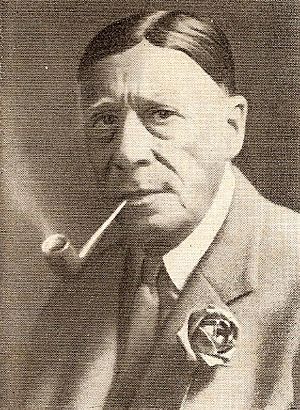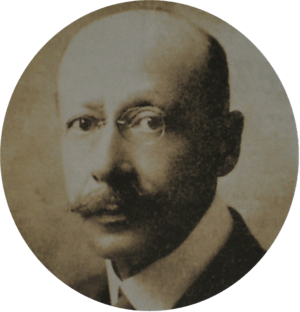José Gil Fortoul facts for kids
Quick facts for kids
José Gil Fortoul
|
|
|---|---|
 |
|
| President of Venezuela | |
| In office 5 August 1913 – 19 April 1914 |
|
| Preceded by | Juan Vicente Gómez |
| Succeeded by | Victorino Márquez Bustillos |
| Personal details | |
| Born | 25 November 1861 Barquisimeto, Venezuela |
| Died | 15 June 1943 (aged 81) Caracas, Venezuela |
| Spouse | Luisa Marcadet |
| Alma mater | Central University of Venezuela |
| Signature |  |
José Gil Fortoul was an important Venezuelan writer, historian, and politician. He was born on November 25, 1861, in Barquisimeto, Venezuela, and passed away on June 15, 1943, in Caracas. For a short time, he even served as the acting president of Venezuela.
As a thinker and expert in law, he was a key figure in a movement called Venezuelan positivism. This way of thinking focused on using science and logic to understand society and government. José Gil Fortoul was also a supporter of the strong leader Juan Vicente Gómez. He helped Gómez's government both in politics and through his writings about history and society. In 1913, Fortoul became the temporary President of Venezuela, holding the position for less than a year.
His Early Life
José Gil Fortoul was born in Barquisimeto on November 25, 1861. He grew up and went to school in El Tocuyo. On July 2, 1880, he earned a Bachelor of Philosophy degree from La Concordia school.
After that, he moved to Caracas to study political science and law at the Central University of Venezuela. He earned his doctorate degree in political science in 1885. While he was a student, Fortoul worked with Adolf Ernst on a newspaper called La Opinion. His articles sometimes caused disagreements with church leaders. His early work with Ernst was one reason he became known as a main member of the Venezuelan positivist movement.
His Career Journey
In 1886, Fortoul became a diplomat, working as a consul for France in Bordeaux. He worked as a diplomat in Europe until 1896. During this time, he represented Venezuela in several different countries, including Liverpool and Frankfurt. While living in Europe, he wrote many books. These included books about how countries are governed (constitutional law), ideas about crime and punishment (penal system philosophy), and his thoughts on life in Paris. He also wrote a novel and a book about fencing.
In 1897, Fortoul returned to Caracas. There, he wrote for Venezuelan newspapers like El Cojo Ilustrado and El Pregonero. The government gave him money to write a history of Venezuela. In 1900, he became a diplomat again, working in Trinidad, Mexico, Liverpool, and Paris. In 1905, he became Venezuela's charge d'affaires (a type of diplomat) in Berlin. He finished writing a constitutional history of Venezuela, and published a second part three years later.
Fortoul took part in the Hague Convention of 1907. He was part of a public debate when he disagreed with a government order to leave the conference. This order was about a motion concerning international debts. After Juan Vicente Gómez took power in 1908, Fortoul regained the government's trust.
From 1910 to 1911, and again from 1914 to 1916, Fortoul served as a senator in the National Assembly of Venezuela. In 1913, he was the President of the Government Council. This happened while Juan Vicente Gómez was away fighting a military conflict. Because of the rules in Venezuela's constitution at the time, this made Fortoul the acting president.
What Was His Impact?
José Gil Fortoul is known as one of the most important figures in Venezuelan positivism. This movement helped bring modern ideas to Venezuela in the mid-1800s. It was connected to developing government systems and the country itself. However, it was also linked to strong, sometimes dictatorial, governments.
Fortoul is remembered as a key supporter of this movement. He promoted modern ideas in Venezuela. He was also closely connected to the strong leader Juan Vicente Gómez. He worked with other allies of Gómez, such as César Zumeta, Pedro Manuel Arcaya, Laureano Vallenilla Lanz, and Victorino Márquez Bustillos.
Many believe that Fortoul's support for the leader Juan Vicente Gómez helped his writings. His books were published more easily and were available to more people than those of other Venezuelan writers of his time.
In 1915, Fortoul helped start the Venezuelan Academy of Political Science.
Books He Wrote
- 1879: Infancia de mi Musa (Barquisimeto, Venezuela)
- 1887: Recuerdos de París (Barcelona, Spain)
- 1888: Julián (Leipzig, Germany)
- 1890: Filosofía Constitucional (Paris, France)
- 1891: Filosofía Penal (Brussels, Belgium)
- 1891: El Humo de mi Pipa (Paris, France)
- 1892: La Esgrima Moderna (Liverpool, England)
- 1892: ¿Idilio? (Liverpool, England)
- 1895: Pasiones (Paris, France)
- 1896: El Hombre y la Historia (Paris, France)
- 1909: Historia Constitucional de Venezuela (Berlin, Germany)
- 1915: Discursos y Palabras (Caracas, Venezuela)
- 1916: De Hoy para Mañana (Caracas, Venezuela)
- 1931: Sinfonía inacabada y otras variaciones (Caracas, Venezuela)
- 1944: Páginas de Ayer (published after his death).
See Also
 In Spanish: José Gil Fortoul para niños
In Spanish: José Gil Fortoul para niños
- Venezuela
- Presidents of Venezuela
- List of Venezuelan writers
 | John T. Biggers |
 | Thomas Blackshear |
 | Mark Bradford |
 | Beverly Buchanan |


